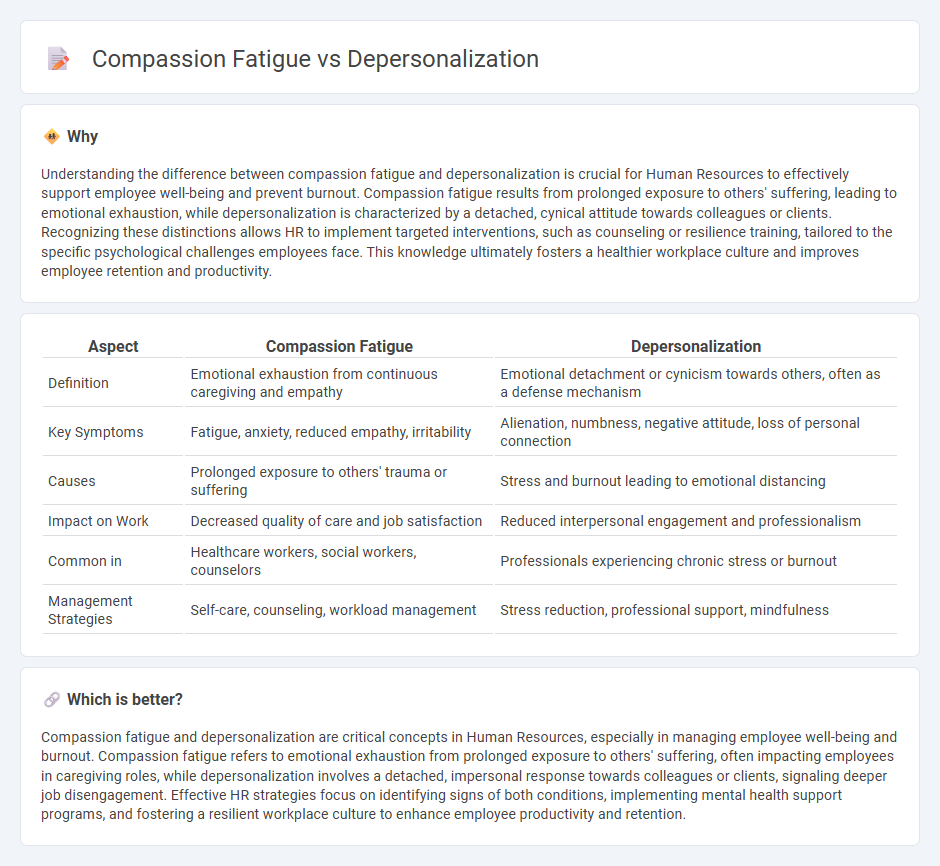
Compassion fatigue and depersonalization are critical concerns in human resources that impact employee well-being and productivity. Compassion fatigue refers to emotional exhaustion from caring for others, while depersonalization involves detachment and a cynical attitude towards coworkers and clients. Explore effective strategies to manage these challenges and promote a healthier workplace in your HR practices.
Why it is important
Understanding the difference between compassion fatigue and depersonalization is crucial for Human Resources to effectively support employee well-being and prevent burnout. Compassion fatigue results from prolonged exposure to others' suffering, leading to emotional exhaustion, while depersonalization is characterized by a detached, cynical attitude towards colleagues or clients. Recognizing these distinctions allows HR to implement targeted interventions, such as counseling or resilience training, tailored to the specific psychological challenges employees face. This knowledge ultimately fosters a healthier workplace culture and improves employee retention and productivity.
Comparison Table
| Aspect | Compassion Fatigue | Depersonalization |
|---|---|---|
| Definition | Emotional exhaustion from continuous caregiving and empathy | Emotional detachment or cynicism towards others, often as a defense mechanism |
| Key Symptoms | Fatigue, anxiety, reduced empathy, irritability | Alienation, numbness, negative attitude, loss of personal connection |
| Causes | Prolonged exposure to others' trauma or suffering | Stress and burnout leading to emotional distancing |
| Impact on Work | Decreased quality of care and job satisfaction | Reduced interpersonal engagement and professionalism |
| Common in | Healthcare workers, social workers, counselors | Professionals experiencing chronic stress or burnout |
| Management Strategies | Self-care, counseling, workload management | Stress reduction, professional support, mindfulness |
Which is better?
Compassion fatigue and depersonalization are critical concepts in Human Resources, especially in managing employee well-being and burnout. Compassion fatigue refers to emotional exhaustion from prolonged exposure to others' suffering, often impacting employees in caregiving roles, while depersonalization involves a detached, impersonal response towards colleagues or clients, signaling deeper job disengagement. Effective HR strategies focus on identifying signs of both conditions, implementing mental health support programs, and fostering a resilient workplace culture to enhance employee productivity and retention.
Connection
Compassion fatigue and depersonalization are interconnected phenomena often experienced by human resources professionals and caregivers exposed to chronic workplace stress and emotional exhaustion. Compassion fatigue leads to a diminished capacity to empathize, resulting in depersonalization characterized by emotional detachment and a cynical attitude towards colleagues and clients. This cycle negatively impacts employee well-being and organizational productivity, highlighting the need for proactive mental health interventions in human resources management.
Key Terms
Emotional Exhaustion
Depersonalization involves a detached response to others, often manifesting as numbness or indifference, whereas compassion fatigue specifically refers to emotional exhaustion caused by prolonged exposure to others' suffering. Health professionals frequently experience both, with depersonalization acting as a defense mechanism against compassion fatigue's overwhelming stress. Explore in-depth distinctions and coping strategies to better manage emotional exhaustion in caregiving roles.
Empathy
Depersonalization and compassion fatigue both diminish empathy but originate differently; depersonalization is a psychological defense mechanism causing emotional numbness, while compassion fatigue results from prolonged exposure to others' suffering leading to emotional exhaustion. Empathy erosion in depersonalization manifests as detachment from one's own or others' emotions, whereas in compassion fatigue, empathy is overwhelmed by persistent stress and caregiving demands. Explore deeper insights into managing empathy challenges in healthcare and caregiving professions to enhance emotional resilience.
Burnout
Depersonalization is a key symptom of burnout characterized by emotional numbness and a detached attitude toward clients or patients, whereas compassion fatigue involves a deep emotional and physical exhaustion from prolonged exposure to others' suffering. Both conditions contribute to burnout, which reduces job performance and increases turnover in high-stress professions like healthcare and social work. Explore effective strategies to recognize and address burnout for improved personal well-being and professional resilience.
Source and External Links
Depersonalization - Wikipedia - Depersonalization is a dissociative phenomenon where individuals feel detached from their own bodies, emotions, and sense of self, often experiencing things as unreal or hazy.
Depersonalization/Derealization Disorder - Mental Health Disorders - Depersonalization/derealization disorder involves persistent or recurring feelings of detachment from oneself or the environment, causing distress or functional impairment, and is often triggered by severe stress or trauma.
Depersonalization-Derealization Disorder: Causes & Treatment - Depersonalization-derealization disorder is a mental health condition characterized by recurring episodes of feeling disconnected from one's body, emotions, or surroundings, often requiring psychotherapy and sometimes medication for treatment.
 dowidth.com
dowidth.com